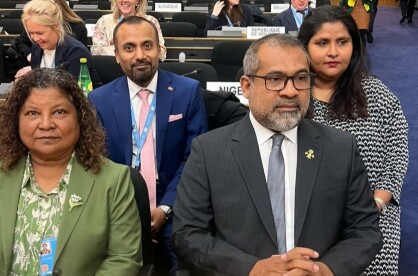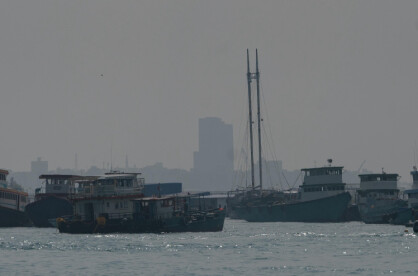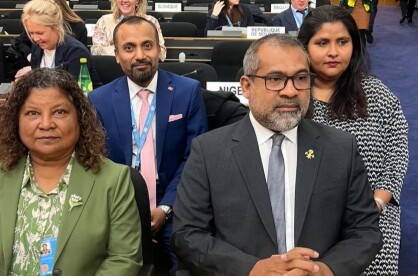The National Minimum Wage
The Government has finally announced the long-delayed National Minimum Wage on 8 November.

Unsplash | Ehimetalor Akhere Unuabona Hire
The Government has finally announced the long-delayed National Minimum Wage on 8 November.

Unsplash | Ehimetalor Akhere Unuabona Hire
Monday, 8 November 2021, was a landmark day for the Maldives. Published in the 50th Volume, Issue 289 of the Maldivian Gazette, a minimum wage was mandated for the first time in the country’s history. This also represents the fulfillment of a key presidential pledge. In order to reflect this initiative, the 2022 budget shows an increase for salaries and wages from MVR4 billion to MVR4.8 billion.
The newly adapted National Minimum Wage (NMW) comes into effect from January 2022, impacting the private as well as the public sector. NMW is set to include base pay and fixed allowances. Varying financial benefits such as overtime, Ramadhan allowance, service charge, bonuses and in-kind benefits are conversely excluded. Micro enterprises in the private sector are also exempted.
Depicted below is what the Minimum Wage Board proposed versus what has been declared.

There is no denying that setting a NMW is going to benefit a large group of employees. Minister of Economic Development Fayyaz Ismail predicts that the benefits of this price ceiling will be felt among 40 to 50 percent of workers – about 54,000 people. A further 13,000 workers in the tourism industry are also predicted to benefit from this as well. Yet, the biggest apprehension among the public is that wage recommendations by the Minimum Wage Board for the private sector were not accommodated. There have been years of research and discussion, and the belief is that what was proposed by the Board is based on current work scenarios – hence, the need to implement what has been proposed.
The other concern is regarding the composition of the minimum pay – which is the combination of base pay and fixed allowances. This goes against what was widely anticipated, where critics and employees fear that some employers might play around with the elements of compensation packages.
Moving forward, here a few things which all stakeholders must be watchful for.
The International Labour Organization (ILO) reports that a minimum wage benefits two categories of workers. Firstly, the ‘bound’ workers - those who previously earned less than a newly introduced minimum wage. This is normally the target group of the policy. However, a second group of employees are likely to experience a pay hike in the near future. ILO defines this as a the ‘ripple’ or ‘spillover’ effects further up the wage distribution. This is the indirect wage increases that take place because employers or workers (or both) want to maintain differences in job status, or higher wages for workers with more seniority or skill.
Monitoring the employment effects of minimum wages is essential. The ILO reports that empirical findings are varied, country and time-specific. Yet, findings from developing countries illustrate mixed findings - employment effects are close to zero and too small to be observable in aggregate employment or unemployment statistics. Other reviews conclude that employment effects are less benign and that minimum wages reduce employment opportunities for the less-skilled workers. Similarly, a 2015 World Bank publication concluded that "… the emerging trend in the literature is that the effects of minimum wages on employment are usually small or insignificant (and in some cases positive)" Furthermore, a 2016 report by the UK Low Pay Commission found that 'no overall statistically or economically significant adverse employment effect, neither on employment and hours, nor on employment retention probabilities.'
Critics of minimum wage fear that increase in wage rates will be passed on to consumers through price increases thereby slowing spending and economic growth. However, there are conflicting views on whether raising the minimum wage increases inflation. Some economists argue that raising the minimum wage creates imbalances in the labor market and leads to what is often described as a wage push inflation. On the other hand, historically, minimum wage increases have had only a very weak association with inflationary pressures on prices in an economy. For example, in 2016, researchers from the W.E. Upjohn Institute for Employment Research found that "[Using monthly price series] ... the pass-through effect is entirely concentrated on the month that the minimum wage change goes into effect, and is much smaller than what the canonical literature has found."
Studies have shown a positive correlation between setting a minimum wage and higher productivity of labour - both at the enterprise level and at the aggregate economy-wide level. At the enterprise level, workers may be motivated to work harder. They may also stay longer with their employer, gaining valuable experience and also encouraging employers and employee to engage in productivity-enhancing training. At the aggregate level, minimum wages can result in more productive firms replacing least productive ones – and surviving firms becoming more efficient. These mechanisms can increase overall economy-wide productivity.
Minister of Economic Development Fayyaz Ismail has said that the Maldivian economy, at the current juncture, is not strong enough to include expatriate workers in the mandated NMW. This exclusion of expatriates can lead to further exploitation and ostracization, which is a separate, yet critical argument in itself. Since the declaration by Minister Fayyaz, the biggest outcry has been whether this makes locals labour expensive compared to expatriate workers. A comparative analysis of labour costs is required here. If the cost of other expenses often paid to expatriate employees are taken into account, then local workers are not necessarily expensive, even with the minimum wage. Take into consideration, visa payments, annual ticket, yearly fees and other allowances often paid to expatriate workers.
There are calls for the government to ensure that the minimum wage cover living expenses, particularly pertaining to monthly rent. However, this distress cannot be addressed by a minimum wage. What is required here is a living wage. Living wage is the remuneration received for a standard workweek by a worker in a particular place, sufficient to afford a decent standard of living for the worker and her or his family. Elements of a decent standard of living include food, water, housing, education, health care, transportation, clothing, and other essential needs including provision for unexpected events. In other countries, minimum wages and living wages co-exist albeit the latter being optional than mandatory. Having this option creates the scenario for large, successful organizations to offer this for their workers, thus bringing in positive multiplier effects in the economy.



